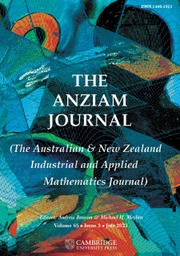Crossref Citations
This article has been cited by the following publications. This list is generated based on data provided by Crossref.
TEO, K. L.
and
YEO, L. T.
1979.
On the computational methods of optimal control problems.
International Journal of Systems Science,
Vol. 10,
Issue. 1,
p.
51.
Lixin Cui
Ruiqing Zhao
and
Wansheng Tang
2007.
Principal-Agent Problem in a Fuzzy Environment.
IEEE Transactions on Fuzzy Systems,
Vol. 15,
Issue. 6,
p.
1230.

